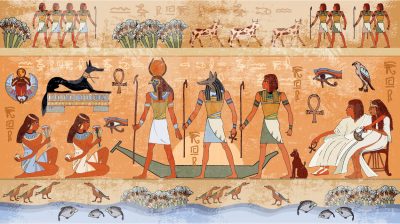
by: Rev. Rebecca J. Brimmer, International President and CEO
One of the greatest leaders in all of history is Moses. He was chosen by God to lead the Children of Israel from slavery in Egypt to becoming a nation. Author Michael Shapiro wrote a book called The Jewish 100: A Ranking of the Most Influential Jews of All Time. He gives the number one ranking to Moses, recognizing Jesus as number two. As a Christian, I would reverse the order. Moses was immortalized on the silver screen when Charlton Heston brought this leader’s personality to life in the epic film The Ten Commandments. How did God form this great leader? What obstacles did he face on the path to leadership? We find some answers in the first few chapters of the book of Exodus.
In Hebrew, this book is called Shemot (names) because it begins with a list of all the children of Jacob who came to Egypt. What follows is a bridge of history covering hundreds of years. A new pharaoh arose who didn’t remember Joseph and was alarmed at the huge number of Israelites living in Egypt. He feared they would be a fifth column against Egypt and his leadership. So he decided to enslave them and keep them firmly in check. Things went from bad to worse. Finally, he decided to reduce their numbers by having all baby boys killed at birth. What happens when you kill all Israelite boys? The Israelite girls would be forced to marry Egyptians, and the nation of Israel would cease to exist in just a few short years. Pharaoh tasked two Hebrew midwifes, Shiphrah and Puah, with the gruesome task of killing all newborn baby boys.
 The midwives disobeyed the law of the land issued by Pharaoh and heeded a higher calling in the first biblical instance of civil disobedience. They stood for what was right, even at risk of their own safety. When they were asked to explain why they weren’t killing the baby boys, they cleverly responded: “Because the Hebrew women are not like the Egyptian women; for they are lively and give birth before the midwives come to them” (Exod. 1:19b).
The midwives disobeyed the law of the land issued by Pharaoh and heeded a higher calling in the first biblical instance of civil disobedience. They stood for what was right, even at risk of their own safety. When they were asked to explain why they weren’t killing the baby boys, they cleverly responded: “Because the Hebrew women are not like the Egyptian women; for they are lively and give birth before the midwives come to them” (Exod. 1:19b).
Finding the way to live under ungodly leadership and remain true to God can be challenging. During the time of the Holocaust, many true believers chose to disobey Nazi law when it contradicted the higher law of God by hiding Jews. They did it because they feared God more than man. It was the right thing to do.
Surely the midwives must have done a lot of soul searching and praying for God to protect and guide them. Without their decision for righteousness, Moses would have been killed at birth.
Pharaoh didn’t give up. Plan B involved telling all the people—including parents—to kill the boys by casting them in the river.
Moses was born with a death sentence. Disobeying the law of the land, his family hid him for three months. Then his mother literally fulfilled the law of casting him into the water, but cleverly gave him a chance at life by putting him in a small basket/boat before doing so.
His sister, Miriam, was given the job of watching the little vessel. The family must have known where Pharaoh’s daughter bathed. How they must have prayed that she would have compassion on the helpless babe. Of course, she did! Then Miriam came forward with a plan to care for the child. What a turn of events! Moses was saved from the death penalty, and his adoptive mother paid his birth mother to nurse him. I am sure there was rejoicing in the home that day.
Had it not been for five amazing women, Moses would never have survived to fulfill the purposes God had for his life. The midwives, his mother, his sister and his new adoptive mother displayed courage, strategic thinking and love, which rescued baby Moses from certain death.
In his early years, Moses was nurtured and taught by his Israelite parents. Then he was given the best education that Egypt could provide by virtue of being adopted into the royal family. We don’t know how old he was when he went to live with Pharaoh’s daughter, yet clearly, he never forgot his birth identity.
Lesson to Learn
God uses many people and events to make sure His plans come to fruition. He is looking for people who will do what is right, even at personal risk.
Tom and I were called to Israel in our early 20s. Were we ready? No, but we thought we were. God kept us in a training phase for eight years before allowing us to move ahead with the call. Was Moses aware of God’s call as a young man? We don’t know. One day, he saw an Egyptian overseer abusing an Israelite, and taking matters into his own hands, he killed the oppressor. Because of this angry and impetuous action, Moses had to flee for his life. I have learned that it isn’t enough to have God’s calling on your life. You must also do things God’s way, reflecting His character, and you must wait for God’s timing. Clearly murder is not the way to kick-start a great ministry. Moses’s actions could have invalidated him as a leader. In fact, he lost his position of royalty and fled for his life.
 Moses married a daughter of a Midianite priest and had children. He worked for his father-in-law as a shepherd. He was a working man, earning his living by hard, physical labor. He must have had some regrets, but he seems settled in his place.
Moses married a daughter of a Midianite priest and had children. He worked for his father-in-law as a shepherd. He was a working man, earning his living by hard, physical labor. He must have had some regrets, but he seems settled in his place.
It must have seemed highly unlikely that Moses would become the leader of a nation. Can God use a murderer? A shepherd? A son of a slave?
Lesson to Learn
Don’t get ahead of God or try to force the vision to happen. Wait for His timing and do it in His way with His character.
God heard the groanings of the Children of Israel and remembered His covenant (Exod. 2:24). Now He was ready to act on their behalf. He revealed Himself to Moses in the burning bush that was not consumed. Exodus 7:7 tells us that Moses was 80 years old when he met with Pharaoh, so he was not a young man when he encountered God at the burning bush. What a shocking experience it must have been.
God called Moses to be His agent to bring freedom to the tribes of Israel (Exod. 3:7–10). Unfortunately, Moses was not as ready. He felt unworthy, unprepared, unskilled and inadequate. He didn’t know what he would say so that people would follow him. He worried about his reputation as a murderer. He may have thought that they wouldn’t follow a working-class man. So he tried to talk God out of the call.
God answered all of Moses’s concerns and all of his questions. Moses didn’t know what he should say, so God gave him the narrative. Moses was still not convinced that he was capable of influencing others. What if people doubted his encounter with God? What if they didn’t believe? What if they wouldn’t even listen? God must have also thought that was a real risk, because He proceeded to give Moses tools—miraculous signs that he could use to convince the people. They were almost like superpowers. Moses could turn a stick into a snake and vice versa; he could turn his hand leprous and vice versa; he could take water from the river and turn it into blood.
Somehow the boldness of young Moses had turned to fear over the years. He was afraid of what people would think of him. He was afraid he wouldn’t be able to speak eloquently. He was afraid that Pharaoh wouldn’t let the people go. He was afraid of failure. He was afraid of people. This fear motivated Moses to ask God to send someone else. God wasn’t pleased, but He compromised and agreed to give Aaron as a helper. Reluctantly, Moses eventually agreed to accept the call.
Lesson to Learn
It is okay to confirm the call. It is okay to ask God for the tools you need. It is not okay to allow fear to motivate your decision. Have faith in God! He will not leave you without input. He will guide each step of the way. He will give you the tools you need.
Moses and Aaron went to the Israelite people. Aaron spoke, Moses gave the signs and the people believed. “And when they heard that the Lord had visited the children of Israel and that He had looked on their affliction, then they bowed their heads and worshiped” (Exod. 4:31b).
The first step had been accomplished! The people listened, the people believed Moses and they were motivated to turn to God in worship. There would be many steps ahead which would threaten their newfound joy and peace. Life is like that—never static, not perfect and giving many opportunities to choose fear or faith.
 Buoyed by their success, Moses and Aaron sought an appointment with Pharaoh. They were met with crushing defeat as Pharaoh completely rejected their request. Pharaoh didn’t seem to know about their God. He certainly had no fear of Him. He reacted angrily and made their labor even harder. He demanded they provide their own straw without reducing the quota of bricks. The Jewish managers were beaten. They complained, but to no avail. Overwhelmed, fatigued, in pain and with no hope, they turned on Moses and Aaron. “This is all your fault,” they said.
Buoyed by their success, Moses and Aaron sought an appointment with Pharaoh. They were met with crushing defeat as Pharaoh completely rejected their request. Pharaoh didn’t seem to know about their God. He certainly had no fear of Him. He reacted angrily and made their labor even harder. He demanded they provide their own straw without reducing the quota of bricks. The Jewish managers were beaten. They complained, but to no avail. Overwhelmed, fatigued, in pain and with no hope, they turned on Moses and Aaron. “This is all your fault,” they said.
The mountaintop experience of the first encounter with the Children of Israel was over. Moses again battled feelings of failure. The encounter with Pharaoh seemed to have backfired, and now Moses’s own people had turned against him. So Moses went up-line, asking: “God, what is going on? Why have You sent me? You haven’t delivered Your people. Why are You bringing trouble on this people?”
Lesson to Learn
Don’t give up when the going gets tough. Take your concerns to the Lord.
This wasn’t the end of the story. There would be many more steps on the way to freedom. The Exodus never would have happened without a God who remembered His covenant, faithful midwives, a strategic mother and sister, a compassionate princess, a reluctant leader and Moses’s brother, Aaron.
What is God calling you to do? You can trust Him to do it—in His time and His way. Don’t be sidetracked by your own thinking. Listen to Him and He will speak. He will give you the message and the tools you need for the job. Your job is to listen, trust, humbly recognize that this is His call, pray when things go wrong, trust Him for strategies, be prepared to think outside the box, and trust some more.
Photo Credit: Click on photo to see photo credit
All logos and trademarks in this site are property of their respective owner. All other materials are property of Bridges for Peace. Copyright © 2025.
Website Site Design by J-Town Internet Services Ltd. - Based in Jerusalem and Serving the World.